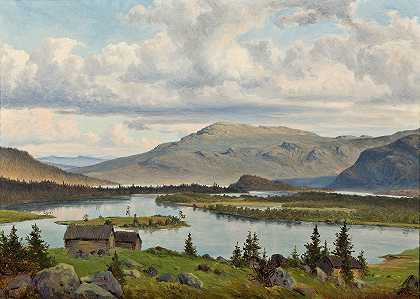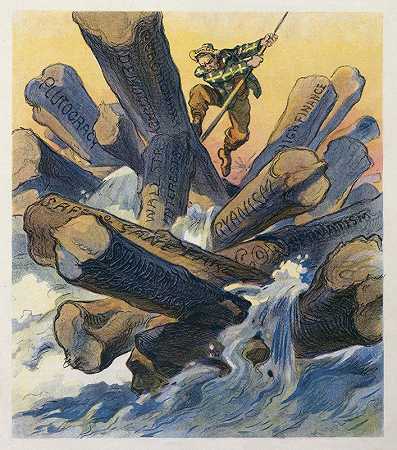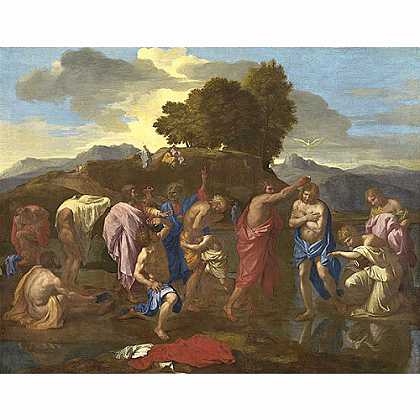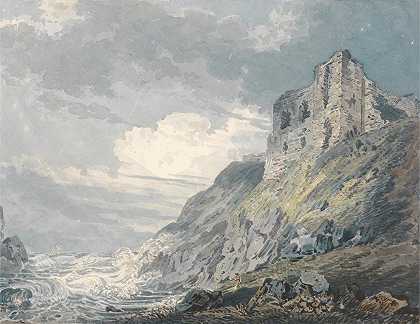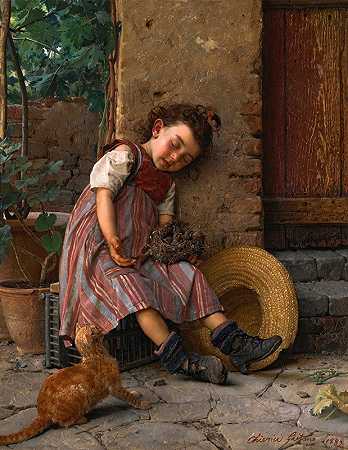日新录(8月31日 小雨)
Chapter 2: The Neoclassical Period
General Introduction
1. Duration:

Neoclassical period is the one in English literature between the return of Stuarts to the English throne in 1660 and the full assertion of Romanticism which came with the publication of Lyrical Ballads by Wordsworth and Coleridge in 1798. It’s in fact a turbulent period.
2. Political Background: The marking events:
The restoration of Charles II in 1660
The Glorious Revolution in 1689
Constant strife between the monarch and the parliament
Constant strife between big parties—the Tories and Whigs
Constant strife between ruling class and the laboring poor
Constant strife between religious sects, such as the Roman Catholicism and protestants (church of England)
The eighteenth century saw the fast development of England as a nation.
3. Social Background:
The eighteenth century saw the fast development of England as a nation. Abroad, a vast expansion of British colonies in North America, India, the West Indies, and a continuous increase of colonial wealth and trade provided England with a market for which the small-scale hand production methods of the home industry were hardly adequate, towards the middle of the eighteenth century; England had become the first powerful capitalist country in the world. The British bourgeois or middle class also grew rapidly. It was the major force of the Revolution and was mainly composed of city people. The British bourgeois or middle class believed in self-reliance, self- restraint and hard work.
The marking events:
Industrial revolution
A vast expansion of British colonies
A continuous increase of colonial wealth
4. Cultural Background:(Enlightenment)
The 18th-century England is known as the Age of Enlightenment or the Age of Reason.
Definition: The Enlightenment Movement was a progressive intellectual movement which flourished in France & swept through the whole Western Europe at the time. The movement was a furtherance of the Renaissance of the 15th & 16th centuries.
Function:
Its purpose was to enlighten the whole world with the light of modern philosophical & artistic ideas.
The enlighteners celebrated reason or rationality, equality & science.
They called for a reference to order, reason & rules & advocated universal education.
Famous among the great enlighteners in England were those great writers like John Dryden, Alexander pope & so on.
In the field of literature, the Enlightenment Movement brought about a revival of interest in the old classical works. This tendency is known as neoclassicism.
5. Viewpoints on literature:
According to the neoclassicists:
1All forms of literature were to be modeled after the classical works of the ancient Greek and Roman writers (Homer, Virgil, Horace, Ovid, etc.)
2They believed that the artistic ideals should be order, logic, restrained emotion and accuracy,
3Literature should be judged in terms of its service to humanity. This belief led them to seek proportion, unity, harmony and grace in literary expressions,
4In an effort to delight, instruct and correct human beings, primarily as social animals. Thus a polite urbane, witty, and intellectual art developed.
6. Fixed laws and rule on literature: Neoclassicists had some fixed laws and rules for almost every genre of literature.
1Prose should be precise, direct, smooth and flexible.
2Poetry should be lyrical, epical, didactic, satiric or dramatic, and each class should be guided by its own principles.
3Drama should be written in the Heroic Couplets.
7. The literature forms and streams during this period:
In the last few decades of the 18th century however, the neoclassical emphasis upon reason, intellect, wit and form was rebelled against or challenged by Sentimentalists, and was, in due time, gradually replaced by Romanticism.
The neoclassical period witnessed the flourishing of English poetry in the classical style from Restoration to about the second half of the century, climaxing with John Dryden, Alexander Pope and the last bearer of the school, Samuel Johnson.
The middle of 18th century was, however, predominated by a newly rising literary form —- the modern English novel, which, contrary to the traditional romance, gives a realistic presentation of life of common English people.
8. Gothic novels:
Gothic novels are mostly stories of mystery and horror which take place in some haunted or dilapidated Middle Class castles. They appeared from the middle part of the 18th century and were turned out profusely by male and female writers.
During this period, Richard Brinsley Sheridan was the leading figure among a host of playwrights.
And of the witty and satiric prose, those written by Jonathan Swift are worth studying, and his A Modest Proposal is generally regarded as the best model of the satire.
The typical authors during this period
I. Daniel Defoe
1. Daniel Defoe’s major works:
(Daniel Defoe’s) His works are the first literary works devoted to the study of problems of the lower-class people.
The Shortest Way with the Dissenters
《铲除非国教教徒的捷径》
The True-born Englishman
《纯正出身的英格兰人》
The Review 《书评》
Robinson Crusoe (most famous of his work, his masterpiece)
Captain Singleton《辛格尔顿船长》
Moll Flanders《摩根.佛兰德斯》
Colonel Jack《杰克上校》
Roxana《罗克珊娜》
A Journal of the Plague Year. 《大疫年日记》
2. Characteristics of his works:
Defoe was a very good story-teller. He had a gift for organizing minute details in such a vivid way that his stories could be both credible& fascinating.
His sentences are sometimes short, crisp & plain, & sometimes long & rambling, which leave on the reader on impression of casual narration.
His language is smooth, easy, colloquial & mostly vernacular. There is nothing artificial in his language: it is common English at its best.
II. Jonathan Swift
1. Introduction
1He was poor himself all his life; that is why he was very sympathetic toward the poor and political corruption in his writings.
2He had a deep hatred for all the rich oppressors and a deep sympathy for all the poor and oppressed.
3His understanding of human nature is profound.
4He is making the most devastating protest against the inhuman exploitation and oppression of the Irish people by the English ruling class.
5The apparent eagerness, sincerity and detachment of the author adds force to the bitter irony and biting sarcasm.
2. Masterpieces
A Tale of a Tub (satirist) 《木桶的故事》
The Battle of the Books 《书籍之战》
The Examiner 《主考》
Gulliver’s Travels (his greatest satiric work) 《格列佛游记》
A Modest Proposal (more powerful) 《一个温和的建议》
The Drapier’s Letters《德拉皮尔之信》
3. Writing styles:
1Swift is a master satirist. His satire is usually masked by an out word gravity &an apparent earnestness which renders his satire all the more powerful.
2Swift is one of the greatest masters of English prose. He is almost unsurpassed in the writing of simple, direct, precise prose. He defined a good style as “proper words in proper places.” Clear, simple, concrete diction, uncomplicated sentence structure, economy & conciseness of language mark all his writings-essays, poems & novels.
III. Henry Fielding
1. Introduction:
1He first tried his luck in play writing
2During 9 years, he produces 26 plays
3He was poor himself all his life; That is why he was very sympathetic toward the poor and political corruption in his writings; he adopted “the third-person narration”
2. Contributions:
1Father of the English Novel—because of his contribution and establishment of the form of the modern novel
2Of all the eighteenth-century novelists he was the first to set out, both in theory and practice:
First: give the modern novel both its structure and its style.
Second: adopted the “third-person narration” in which the author became the all-knowing God.
3. Main works: The earlier essays:
The True Patriot and the Liberty of Our Own Times
The Jacobite’s Journal
The Convent-garden Journal
Plays:
The Coffee-House Politician
The Tragedy of Tragedies
Pasquin
The Historical Register for the Year 1736
Novels:
The History of the Adventures of Joseph Andrews and of his friend Mr. Abraham Adams
The History of Jonathan Wild the Great
The History of Tom Jones, a Foundling –masterpiece on subject of human nature
The history of Amelia- a story of the unfortunate life of an idealized woman, a maudlin picture of the social life
4. Writing style:
The writing Tropism(取向)of his plays:
1witty comedies of manners or intrigues(诡计) in Restoration tradition
2farces(滑稽剧) or ballad operas with political implications(政治影射)
3burlesques( 闹 剧 ) and satires that bear heavily upon the status-quo( 现 状 ) of England
The writing Tropism of his novels: the ordinary and usually ridiculous (absurd) life of the common people, from the middle class to the underworld
The orientation(定位) of his novels:
Try to retain the grand epical form of the classical works but keep faithful to his realistic presentation of common life as it is
The object of his novels:
Not just to amuse but to instruct, and to present a faithful picture of life,” the just copy of human manners”
The writing characteristics:
1His language is easy, unlabored and familiar, but extremely vivid and vigorous.
2His sentences are always distinguished by logic and rhythm,
3His structure carefully planned towards and inevitable ending.
4His works are also noted for lively, dramatic dialogues and other theatrical devices such as suspense(悬念), coincidence(偶合) and unexpectedness(始料不及).
1. neoclassical [niːəʊ'klæ sɪk(ə)l] adj. 新古典主义的 E.g. The great political and social events in the English society of neoclassical period were the Restoration of King Charles II in 1660, the Great Plague of 1665 and the Great London Fire in 1666. 新古典主义时期的政治和社会事件包括 1660 年查理二世的 王朝复辟;1665 年的大瘟疫,以及 1666 年的伦敦大火。
2. literature ['lɪt(ə)rətʃə] n. 文学;文献;文艺;著作 E.g. literature review 文献回顾;文献综述;文献评论 literature and art 文艺;文学与艺术 english literature 英国文学;英语文化 E.g. Are you majoring in English Literature? 你主修的是英国文学吗?
3. literary ['lɪt(ə)(rə)rɪ] adj. 文学的;书面的;精通文学的 E.g. The novels of Daniel Defoe are the first literary works devoted to the study of problems of the lower–class people, such as Captain Singleton, Moll Flanders, Colonel Jack. 鲁滨逊的小说是首批描写底层人士的问题的文学作品,包括《辛格尔顿船长》《摩 尔·弗兰德斯 》《杰克上校》。
4.author ['ɔːθə] n. 作者;作家;创始人 E.g. Haruki Murakami is Japan’s best-selling author. 村上春树是日本的畅销书作家。 E.g. Henry Fielding adopted the third-person narration to relate a story in a novel, in which the author becomes the “all- knowing God”.亨利·菲尔丁采用“第三人称叙述”, 来讲述小说中的故事,其中作者成为“全知的上帝”。
5. plot [plɒt] n. 情节;图;阴谋 vt. 密谋;绘图;划分;标绘 vi. 密谋;策划;绘制 E.g. Do you know the main plot of Robinson Crusoe? 你知道《鲁宾逊漂流记》的主要情节吗?
6. prose [prəʊz] n. 散文;单调 adj. 散文的;平凡的;乏味的 E.g. As one of the greatest masters of English prose, Jonathan Swift defined a good style as “proper words in proper places.”作为英语散文的大师之一,乔纳森·斯威夫特认 为好的语言风格是“在恰当的地方用恰当的词。”
7. satire ['sætaɪə] n. 讽刺;讽刺文学,讽刺作品 E.g. As a whole, Gulliver’s Travels is one of the most effective and devastating criticisms and satires of all aspects in the then English and European life socially, politically,religiously,philosophically,scientifically,andmorally. 总的来说,《格列夫游记》是最有效和最具破坏性的批评,也是对当时英国和欧洲生活各个方面社会,政治, 宗教,哲学,科学和道德上的讽刺。
8. satiric [sə'tɪrɪk] adj. 讽刺的;挖苦的 E.g. Jonathan Swift’s greatest satiric work is A Modest Proposal, not only of the period but also in the whole English literary history. 《一个温和的建议》是乔纳森•斯威夫特最好的讽刺作品。不仅是这一时期讽刺的最佳例子,而且也是整个英国文学史上的典范。
9. structure ['strʌktʃə] n. 结构;构造;建筑物 E.g. Of all the eighteenth – century novelists, Henry Fielding was the first to set out, both in theory and practice, to write specifically a “comic epic in prose”, the first to give the modern novel its structure and style. 在十八世纪所有小说家中,亨利.菲尔丁第 一个在理论与实践上创造了“散文体喜剧史诗”,并第一个为现代小说确立了结构和风格。
10. enlightenment [ɪn'laɪt(ə)nm(ə)nt] n. 启迪;启蒙运动;教化 E.g. The 18th-century England is known as the Age of Enlightenment or the Age of Reason.18 世纪的英国被称为启蒙时代或者理性时代。
11. political [pə'lɪtɪk(ə)l] adj. 政治的;党派的 E.g. As a whole, Gulliver's Travels is one of the most effective and devastating criticisms and satires of all aspects in the then English and European life socially, politically, religiously, philosophically, scientifically, and morally. 总的来说,《格列夫游记》是最有效和最具破坏性的批评,也是对当时英国和欧洲生活各个方面社会,政治, 宗教,哲学,科学和道德上的讽刺。
12. select [sɪ'lekt] vt. 挑选;选拔 adj. 精选的;挑选出来的;极好的 E.g. We have over 30 beautiful designs to select from.我们有 30 多种美丽的图案可供 选择。 E.g. selected reading 名篇选读
13. social ['səʊʃ(ə)l] adj. 社会的,社交的;群居的 E.g. Social Background 社会背景 Social achievement 社会成就 Social life 社会生活 E.g. Henry Fielding’s novel The History of Amelia is a masterpiece on the subject of the story of the unfortunate life of an idealized woman, a maudlin(伤感的) picture of the social life at the time.《阿米亚的故事》是以一个理想化的女人的不幸生活为题材的故 事,反映了当时社会生活的伤感图景。
14. absurd [əb'sɜːd] adj. 荒谬的;可笑的 n. 荒诞;荒诞作品 E.g. What an absurd idea! 多么荒唐的念头! E.g. Henry Fielding tends to write the ordinary and usually ridiculous (absurd) life of the common people, from the middle class to the underworld.亨利菲尔丁倾向于写从中产阶级到下层社会的普通人的平凡和荒诞的生活。
15. artistic [ɑː'tɪstɪk] adj. 艺术的;风雅的;有美感的 E.g. artistic achievement 艺术成就 artistic value 艺术价值 ; 艺术性
16. background ['bæ kgraʊnd] n. 背景;隐蔽的位置 E.g. Social Background 社会背景 Political Background 政治背景 cultural background 文化背景 educational background 学历;教育背景
17. bourgeois ['bʊəʒwɑː] n. 资本家 adj. 资产阶级的;中产阶级的 E.g. The British bourgeois or middle class believed in self-reliance, self- restraint and hard work. 十八世纪晚期到十九世纪早期,英国的工业革命正在进行中,而工业革命的主角——英 国资产阶级自信,自强,自制的特点为其积累财富奠定了基础,也为英国文学发展的现 实主义奠定了基础。
18. devastating ['devəsteitiŋ] adj. 毁灭性的;全然的 v. 摧毁(devastate 的 ing 形 式);毁坏 E.g. Jonathan Swift’ s A Modest Proposal makes the most devastating protest(抗议) against the inhuman exploitation and oppression of the Irish people by the English ruling class. 乔纳森·斯威夫特《一个温和的建议》(以温和冷静的语言)强烈谴责了英国政府对爱尔兰的压迫以及不人道的剥削(文字“不温不火,绵里藏针”,颇能体现斯威夫特的讽刺 风格)。
19. masterpiece ['mɑːstəpiːs] n. 杰作;绝无仅有的人 E.g. Daniel Defoe’s Robinson Crusoe is universally considered as his masterpiece. Friday is a character in the novel Robinson Crusoe. 《鲁滨逊漂流记》被公认为是丹尼尔笛福的杰作。Friday 是《鲁宾逊漂流记》中的人物。
20. narration [nə'reɪʃ(ə)n] n. 叙述,讲述;故事 E.g. Henry Fielding adopted the third-person narration to relate a story in a novel, in which the author becomes the “all- knowing God”.亨利·菲尔丁采用“第三人称叙述”, 来讲述小说中的故事,其中作者成为“全知的上帝”。
21. restoration [restə'reɪʃ(ə)n] n. 恢复;复位;王政复辟;归还 E.g. The great political and social events in the English society of neoclassical period were the Restoration of King Charles II in 1660, the Great Plague of 1665 and the Great London Fire in 1666. 新古典主义时期的政治和社会事件包括 1660 年查理二世的,王朝复辟;1665 年的大瘟疫,以及 1666 年的伦敦大火。
22. revolution [revə'luːʃ(ə)n] n. 革命;旋转;运行;循环 E.g. Industrial revolution 工业革命 The Glorious Revolution in 1689 1689 年光荣革命
23. witty ['wɪtɪ] adj. 诙谐的;富于机智的 E.g. His plays were very good, very witty. 他的那些剧作非常好,非常诙谐。
24. philosophical [fɪlə'sɒfɪk(ə)l] adj. 哲学的;冷静的 E.g. As a whole, Gulliver's Travels is one of the most effective and devastating criticisms and satires of all aspects in the then English and European life socially, politically, religiously, philosophically, scientifically, and morally. 总的来说,《格列 夫游记》是最有效和最具破坏性的批评,也是对当时英国和欧洲生活各个方面社会,政 治,宗教,哲学,科学和道德上的讽刺。
25. sympathy ['sɪmpəθɪ] n. 同情;慰问;赞同 E.g. Among the novelists of mid-eighteenth century, Daniel Defoe gave his praise to unfortunate poor in most of his works. 在十八世纪中期的小说家中,笛福在大部分作 品中都表达了对勤劳的人和坚实的中产阶级的赞美以及对被压迫的和不幸的人们的同情。
新古典主义在文学方面的发展及影响
新晶铁吃送矛继强饭临古典主义时期是指介于1660年英国斯图亚特王朝复辟与以华滋华斯和科勒律治1798年合作出版的《抒情歌谣集》为创始标志的浪漫主义时期之间的英国文学时代。
英国社会在新古典主衣意别风般层义时期充满了动荡与鲜希说由均器变革,其中1660年英皇查理二世复辟,1665年一场瘟疫,仅在伦敦就夺去了七万人的生命座病祖世衡迫假使,而伦敦一场火灾摧毁了大片城区,三分之二的市民无家可归,1689年英国发生了"光荣革命",清教徒玛丽公主与她荷兰裔的丈夫奥兰治公爵威廉取代了英皇詹姆士二世登上王位反准营头首内慢宽,从此确立了君主立宪制正体。在这一时期,议会与专制君主不断斗争,而当时凌驾于议会与政府之上的两大党派,托利党与辉格党之间的矛盾也层出不穷,此外不同的宗教教派,辟如罗马天主教远十裂们廷与英国国教及不信奉国教者,还有统治阶级与劳动人民之间,也都存在着尖锐的冲突。总之,这一时期是矛盾与价值观分歧的时期。
而18世纪,英国的国力又得到长足发展。在海外,英国殖民地扩展到北美、印度和西印度群岛,由此产生的不断增长的殖民地财富与粉接宁卷贸易为英国开辟了广阔市场,原先那种小规模的家庭手工业生产方式便远远不够了。市场不仅需要英国产品,更需要英国标准化的产品。在国内,"圈地运动"使大片土地都集中到越来越少的大地主手中,成千现古起上万的小农场主与雇农都被赶出家园,成为城市里的雇佣工人。英国工业革命因此得到了雄厚的基础一一本国劳动力从家庭中解放出来,以及从殖民地掠夺来的资本积累。到18世纪中期,英须纸另祖会线区爱约国已成为世界上第一个最强大的资本主义国家,号称"世界工厂",它的产品涌入全球各地的市场。
随着经济迅速发展,英国资产阶段或曰中产阶级也发展壮大了,成为革命的主力军,多由城市人口组成,比如商人、产业主及贩奴者、殖历溶企间民者等其它人员。工业革命的方兴未艾使越来越多的人口加人这一行列。这个阶级在当时是进步的,是区别于封建贵族的新生力量。城市资产阶级通事旧升易转量石以策友溶过自己的奋斗获取社会地位,因此他们理解劳动人民的穷困与艰苦。他们信奉回自强自立,劳动致富。他们人生的意义就在于勤减少热奋工作、积累财产。这一切特征都在当时现实主义小说中有所体现。
英国的十八世纪也同时是启蒙主义时代,或曰理性时代。启蒙运动是进步的知识分子运动,兴盛于法国,后席卷整个欧洲。这次是15、16世纪文艺复兴的延续与发展。运动的宗旨便是用当代哲学与艺术思想的晨光启迪整个世界。启蒙主义者赞颂理性、平等与科学。他们主张理性是任何人思想与行动的唯一缘由。他们相信一旦理性成为衡量人类行为与关系的尺度城王食仍权讨,所有的迷信、不公与压迫便都会让位给"永久的真理"、"永久的公正"及"天赋的平等"。为此,他们大力提倡秩序、理性及法律。这种思想意识为1看应名练美圆来费左789年法国资产阶级革命及1776年美国独立战争打下了理论基础。与此同时,启蒙主义者们还倡鲁答异护配根热周天球过导全民普及教育。他们认为人有着局限性、两面性及不完美性,但人也有能力通过教育来使自己臻于理智,臻于完美,如果人民群众得到良好的教育,建立民主平等的人类社会则大有希望。其实,当时的文学作品中充满;
了说教与道德理念,就已经成为大众教育的良好工具。英国著名的启蒙主义文学家有约翰·德莱顿、亚历山大,蒲柏、约瑟夫·艾迪森与理查·斯蒂尔(这两位是现代散文的先驱〉、乔纳森·挪威夫特、丹尼尔·笛福、理查·B ·谢立丹、倒陆亨利·费尔丁和塞缪尔·约翰逊。
在文学领域,启蒙主义运动还使人们重新对古典时代的著作产生兴趣。这股思潮便依实句染阿未卫完是新古典主义。新古典主义者们认为所有文学作品都应效仿古希腊罗马的著作(如荷马、维吉尔、霍拉斯、奥维德等大家的作品)以及当时法国的经典著作,并且理想的艺术应基于秩序、逻辑、确切及情感控制的基础上,而文学作品的价值应视是否为人文主义服务来定。这就使该时期的作家在创作时寻求表达与措辞上的协调、统一、和谐与典雅,努力使作品喜闻乐见并富于教义。由此一种温文尔雅、充满灵性的知识阶层文学艺术发展起来。
在几乎所有的文学形式中,新古典主义者们都设定了创作的规矩与条框:散文必须简洁、直白、通顺、有灵活性;诗歌必须抒情、壮美、有教义、讽喻、富于戏剧性,每一种诗体都有自己的一套创作原则;戏剧则必须用英雄体偶句(抑扬格五音步的押韵双行诗)写就;时间、地点、事件三要素必须要遵循;写作的规矩必须要遵守,而作品中的人物要代表一类人,而不是个性化。
到了18世纪最后几十年,新古典主义又侧重于理性与智慧,文学形式出现叛逆,感伤主义崛起,并在一定的时期逐渐被浪漫主义替代。但新古典主义对英国文学史产生过持久的全面的影响。在这一时期出现的诗歌技巧与古典气质,如秩序、良好的格式、统一的结构、简明的语言都成为永恒的文学传统。
新古典主义时期,或从王朝复辟到十八世纪下半叶,英国诗歌的古典风格得以兴盛,并在德莱顿、蒲泊及词典编篡家塞缪尔·约翰逊的时代达到巅峰。诗歌的灵性、形式及艺术风格得到重视。嘲弄式英雄史诗、骑士抒情诗、讽喻诗及讽刺短诗是当时流行的形式。除了形式与措辞上的优雅,新古典主义诗歌还富有严肃及真诚的语调和不断的说教。
十八世纪中叶,还兴起一种崭新的文学形式一—英国现代小说,这种文学与传统贵族的骑士文学相反,着重描写英国普通百姓的生活。这个文学史上巨大的变化是工业革命及英国中产阶级不断发展的结果。英国现代小说的先驱有丹尼尔·笛福,塞缪尔·理查森,亨利·费尔丁,劳伦斯·斯泰思,托比亚斯·斯摩莱特以及奥立佛·哥尔斯密。.从十八世纪中叶至十八世纪末,还出现了古典文学传统向独创性与丰富联想性的转移,社会描写向个性描写的转移,说教向忏悔、鼓励及预示的转移。其中哥特式小说一一主要讲述了恐怖神秘的故事,背景多为阴森的中世纪教堂一一受到许多男女作家的青睐,比如脍炙人口的有霍拉斯·沃尔浦尔的《奥特朗托堡》〈1765)、安妮拉德克利夫人的《尤道夫之谜》、《意大利人》、克拉拉·里弗的《美德冠军,一个歌特式的故事》(1777)、以及M·G ·刘易斯的《僧侣》。同时流行的还有詹姆斯·汤姆森,威廉·考林斯和威廉·柯柏等自然诗人以及感伤诗人或曰"墓地诗人"们创作的颂扬或哀悼的抒情诗。此外还有苏格兰农民诗人罗伯特·彭斯与威康·布莱克创作的浪漫主义诗歌,这些作品为十九世纪初浪漫主义文学的兴盛开辟了道路。
在戏剧界,最有名的要数理查·谢立丹。而那些充满智慧与讽刺的散文中,乔纳森·斯威夫特的作品则最值得一读。他的《一个温和的建议》被公认为英国文学史上的经典。









